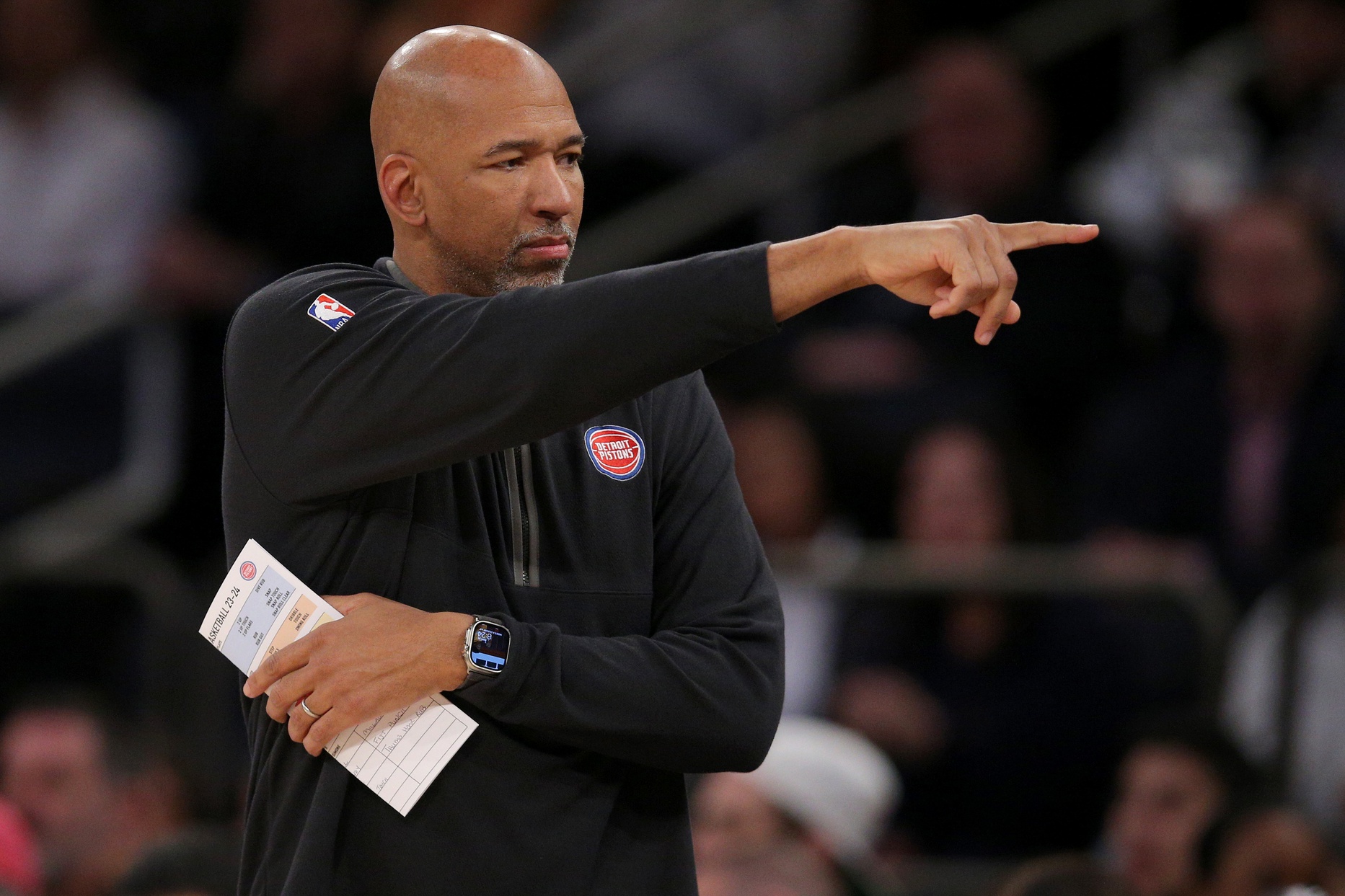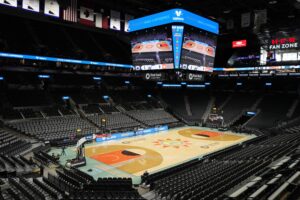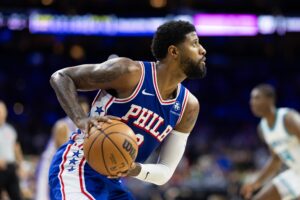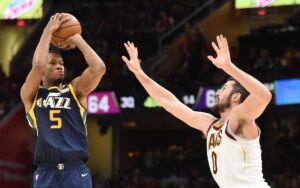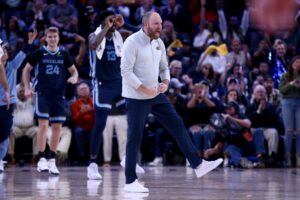The Detroit Pistons’ draft pick history is a rollercoaster of triumphs and missed opportunities. Despite the front office’s knack for identifying remarkable talent, many players have flourished elsewhere due to premature departures or being a part of a roster rebuild. This highlights the players’ potential and stresses the need for top-notch coaching and patience to reach their full potential.
As we’ve witnessed these players thriving in their NBA careers, it’s impossible not to be captivated by what the Pistons could have achieved with them on the team. Let’s craft a Pistons starting five from draft picks since 2000, exploring possibilities to ignite engagement and intrigue in this thrilling exercise.
Cracking the Code: Constructing The Best Pistons Draft Pick Team
Point Guard: Spencer Dinwiddie
Spencer Dinwiddie, the 38th overall pick of the Detroit Pistons in 2014, is the starting point guard. Dinwiddie attended the University of Colorado, where he significantly impacted the team. Despite a promising start to his collegiate career, a torn ACL in his junior season cut it short. Nonetheless, his all-around skills were evident, with averages of 13.0 points, 3.3 rebounds, 2.6 assists, and 1.1 steals over three seasons.
Dinwiddie played only 46 games for the Pistons before being traded to the Chicago Bulls. His opportunity in the NBA came when the Brooklyn Nets signed him in December 2016. Over ten seasons in the NBA, Dinwiddie has averaged 13.3 points, 3.0 rebounds, and 5.2 assists. His success highlights the Pistons’ ability to identify talent and raises questions about their decision to trade him early in his career.
Shooting Guard: Khris Middleton
Khris Middleton, the 39th overall pick of the Detroit Pistons in 2012, is positioned at the shooting guard spot. Middleton, a three-star high school recruit from Charleston, SC, chose Texas A&M for his collegiate career. Middleton’s talent and versatility were undeniable despite injury setbacks, averaging 11.2 points, 4.6 rebounds, 2.0 assists, and 1.0 steals over three seasons.
The Pistons played Middleton sparingly during his rookie season before trading him to the Milwaukee Bucks, where he achieved three-time All-Star status and won an NBA championship. He has been vital to the Bucks’ success, complementing Giannis Antetokounmpo. The trade that sent Middleton to Milwaukee is also cited as a significant missed opportunity for the Pistons.
Small Forward: Tayshaun Prince
Tayshaun Prince, the 23rd overall pick by the Detroit Pistons in 2002, fills the starting small forward spot. Prince attended the University of Kentucky and had a stellar collegiate career. During his four seasons with the Wildcats, he amassed a 97-39 record and made the NCAA tournament yearly. Prince was named the SEC Player of the Year in his junior season and earned a spot on the Associated Press All-SEC team in his junior and senior years. The Wildcats won two SEC titles during Prince’s tenure (1999 & 2001), with Prince being named the tournament’s MVP in 2001.
Prince played in just 42 games in his rookie season. However, it was during the 2003 playoffs that he truly made a name for himself. Down three games to one against the Orlando Magic, coach Rick Carlisle inserted Prince into the rotation. The move proved effective, as Prince contributed significantly on both ends of the floor, averaging 13.3 points and 5.0 rebounds on 54/40/77% shooting while playing standout defense against Tracy McGrady.
This playoff performance solidified Prince’s role as the Pistons’ starting small forward. Over the next six years, Prince missed only two games, made the All-Defensive team four times, and won an NBA championship in 2004. He later played for the Grizzlies and the Timberwolves and is currently part of the Memphis Grizzlies front office.
Power Forward: Greg Monroe
Greg Monroe, the 7th overall pick by the Detroit Pistons in 2010, is the starting power forward. A five-star recruit from Harvey, Louisiana, Monroe attended Georgetown University, where he excelled for two seasons. He earned the title of Big East Rookie of the Year in his freshman year. In his sophomore year, he received multiple accolades, including All-Big East First Team selections and the Associated Press NCAA All-American Third Team. Monroe left Georgetown with career averages of 14.5 points, 8.2 rebounds, and 3.2 assists in 32.6 minutes per game.
Monroe played five seasons with the Pistons, averaging 14.3 points, 9.2 rebounds, 2.3 assists, and 1.2 steals per game. The NBA named him to the All-Rookie Second Team, and he contended for Defensive Player of the Year and Most Improved Player during the 2011-12 season. Monroe became just the second Piston ever to record 1,000+ points and 600+ rebounds in consecutive seasons, joining Grant Hill. Despite his strong performances, the Pistons struggled to build a competitive team around him, and he signed with the Milwaukee Bucks in 2015. Monroe later had stints with the Suns, Celtics, and Raptors.
Center: Andre Drummond
Andre Drummond, the ninth overall pick by the Detroit Pistons in 2012, is the starting center. Drummond, a highly-touted recruit from Mount Vernon, New York, attended the University of Connecticut for one season, averaging 10.0 points, 7.6 rebounds, and 2.7 blocks per game. His strong college performance showcased his potential as a dominant force in the paint.
Drummond played eight seasons with the Pistons, becoming one of the league’s premier rebounders. He averaged 14.4 points, 13.9 rebounds, 1.3 assists, and 1.6 blocks per game during his time in Detroit. Drummond led the NBA in rebounding four times and earned two All-Star selections. Despite his individual success and defensive prowess, the Pistons struggled to find consistent team success. In 2020, the Pistons traded Drummond to the Cleveland Cavaliers, and he subsequently played for the Los Angeles Lakers, Philadelphia 76ers, Brooklyn Nets, and Chicago Bulls.
Missed Opportunities and Lessons Learned
The Pistons’ draft struggles often stem from management decisions, coaching changes, and team dynamics. For instance, the trades involving Dinwiddie and Middleton occurred under different front-office regimes, highlighting inconsistency in long-term vision. A stable coaching environment helped player development. Regarding guys like Monroe and Drummond, the team had done a terrible job building a competent team around them. The new regime must come into the Pistons now to make the best decisions that will not have them trading players who become major successes prematurely.
The Last Word
The Detroit Pistons’ draft history reflects both significant triumphs and missed opportunities. The success of players like Spencer Dinwiddie, Khris Middleton, Tayshaun Prince, Greg Monroe, and Andre Drummond highlights the team’s ability to identify talent. However, the challenge remains in retaining and nurturing players to achieve their full potential within the team. Top-notch coaching and a supportive front office can turn the Pistons’ missed opportunities into future successes, reigniting franchise hope.


